Since the end of April, the catering industry and retail chains have been open again, and the momentum of consumption is also picking up in China. Both exporters from overseas and domestic importers are satisfied with the improving situation and have confidence in the market situation for the second half of the year.
“Despite our 12 years of experience in China, when the COVID-19 outbreak started at the end of January, we were very worried and did not know where the market was headed. But we are very glad to see Chinese authorities’ effective control of the pandemic with proactive measures, the market is recovering steadily, and the consumption momentum is also picking up.” Lucas Rosello at Hortifrut (China) said.
Jiaxing Yuehao is a Chinese fruit importer based in Jiaxing wholesale market. According to the company manager Wei Yuyou, the general import volume of various types of fruits, including citrus, avocado, apple, and more recently blueberry, has steadily been growing since May in the Jiaxing wholesale market. The coming cherry season also seems to be promising.
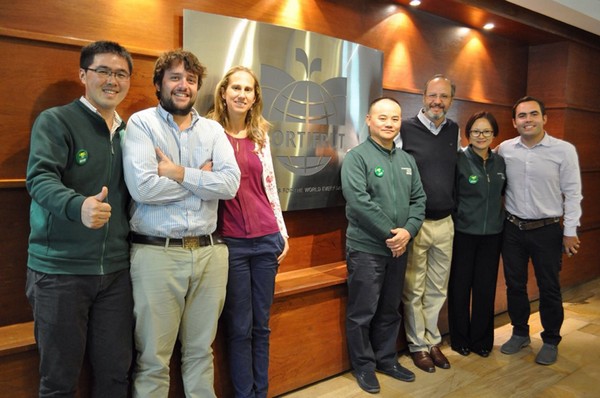 Hortifrut China office
Hortifrut China office
How will the market behave after the COVID-19 epidemic? And what is the trend of the imported fruit sector in China? We interviewed a few companies that are active in the Chinese market, and summarized a few market trends of the imported fruit sector for the foreseeable future.
Booming of E-commerce and collective purchasing
During the epidemic period, citizens prefer not to leave their houses to do shopping, which stimulated e-commerce. Many fruit companies reported that their online sales have at least doubled compared with last year. Besides individual purchasing, community collective purchasing has also become a trend. According to one online platform, community businesses have seized this opportunity to enter the fresh produce market. Community managing agencies collect orders from community households and order big volumes online. The online business then delivers the products to the community, and the small business owners can deliver the individual orders to each apartment.”
In the past few months, people who previously did not understand how to order online have now been forced to engage with e-commerce. Buying online and community collective purchases is becoming an important trend.
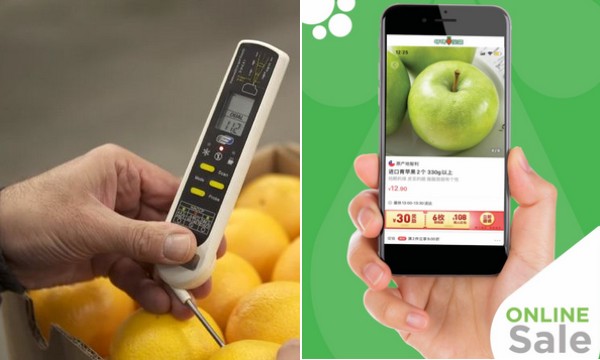 Online sales becomes more popular
Online sales becomes more popular
More attention is drawn to the cold supply chain sector
Recently, coronavirus has been discovered on a few types of frozen seafood. Local authorities are applying strict measures; products are checked more frequently and strictly after arriving at the ports. A Chinese datalogger manufacturer Fresh-Key experienced a sales surge since August.
Tina Sun, the company manager explains, “Trading companies started to pay more attention to cold supply chain management. On one hand, they need to meet the strict measurements from the General Administration of Customs China (GACC). On the other hand, citizens go to supermarkets less frequently and have started buying more online. E-commerce platforms often distribute fresh produce in batches using refrigerated trucks. They need to strictly monitor the logistic process in order to guarantee the perishable products are delivered to each household without reduced freshness.”
 Tina at Fresh-Key is giving a speech on Online Tracking System
Tina at Fresh-Key is giving a speech on Online Tracking System
Chinese consumers willing to pay more but buying less
Although the market is recovering steadily, Chinese consumers are changing their purchasing behaviors and they are willing to pay more for better quality.
Max Leiva is the operation director from the leading South American fruits exporter SVA Fruits. “In recent months, we have seen a trend that consumers are buying fruits in smaller quantity, but with a higher quality demand. People are willing to pay a higher price for premium fruits, but food safety is a priority. They prefer to have the product packaged with production origin information on it. Whereas, those low-quality imported fruits are selling surprisingly slowly in the market.”
Max Leiva believes this will be a market trend for the foreseeable future. “The market will leave less space to those suppliers with poor quality products. Chinese market demand for and consumer perception of imported fruits will be upgraded to a higher level.”
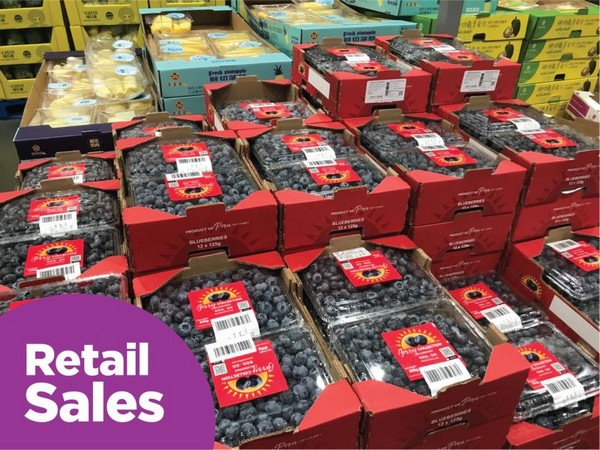 SVA blueberries in Chinese supermarkets
SVA blueberries in Chinese supermarkets
More varieties of fruits are allowed to export to China with increased volume
In recent years, a growing number of fruit varieties obtained permission for export to China, and the import volume of each variety shows a significant increasing trend. “Take avocado as an example: Colombian, Philippino, Dominican and Californian avocados have all obtained permission for export to the Chinese market. The cooperation between authorities played a vital role and we believe more new varieties of fruits coming to China will become a trend. With the huge market demand for and increased consumer awareness of new types of imported fruit, our import volume is growing steadily year-by-year.” Said Duan Xian from Mr. Avacado, a Chinese avocado importer.
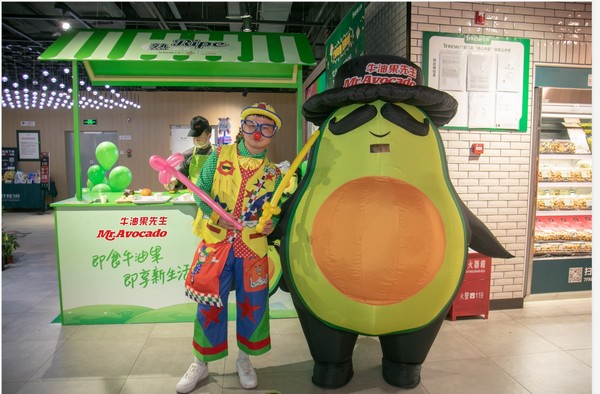 Mr Avocado is promoting varieties of imported avocado in the supermarket
Mr Avocado is promoting varieties of imported avocado in the supermarket
Fruit farms have to meet a high standard to be able to export
Although China is opening up to more varieties of fruits from various origins. Local authorities are still very strict on the production standards in the origin farms. “Take Dutch Conference pear as an example, its export standard to China is one of the highest among all other export destinations.
Farms have to meet certain requirements and restrictions to be able to send their products. We can say, the pears shipped to China are of the highest quality.” This is according to Jaap Pees, the manager of FruitMax (China). “Together with the growers we are also happy and proud to see these high-quality standards of our Dutch pears are being appreciated by the importers and Chinese consumers.” Pears are also the only fruit from Holland that can be exported to China so far.
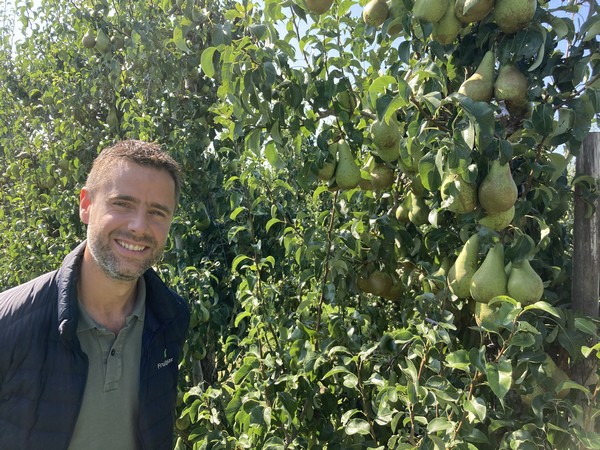 Jaap Pees at Fruit Max China in a Dutch conference pear orchard
Jaap Pees at Fruit Max China in a Dutch conference pear orchard
A few years ago, imported fruits were very expensive and difficult to find in domestic stores but this market is growing so fast and has attracted more and more exporters. On the other hand, the Chinese market also has special characteristics. Just delivering the products is not enough, companies need to know the business culture, market features and consumer behavior in order to succeed in this market.
“China is a market that is incredibly dynamic and is full of potential. We are just at the nascent stages of this exciting journey, and we hope to continue our expansion in this vast market with the support of our partners and customers.” Kevin from RK Growers Italy summarized.
 Varieties fruit from Italy
Varieties fruit from Italy
More information:
Lucas Rosello (Hortifrut): Irosello@hortifrut.com
Wei Yuyou (Jiaxing Yuehao): leo_wei@jxyuehao.com
Tina Sun (FreshKey): tina@fresh-key.com
Max Leiva (SVA Fruits): max@svafruits.com
Duan Xian (Mr. Avacado): duan.xian@mr-avocado.com
Jaap Pees (FruitMax China): jaap@fruitmaxchina.com
Kevin Au Yeung (RK Grower Italy): kevin.auyeung@rkg.it
"fruit" - Google News
December 16, 2020 at 07:55PM
https://ift.tt/2WkFTQJ
Chinese import fruit market gradually recovers after pandemic - hortidaily.com
"fruit" - Google News
https://ift.tt/2pWUrc9
https://ift.tt/3aVawBg
Bagikan Berita Ini














0 Response to "Chinese import fruit market gradually recovers after pandemic - hortidaily.com"
Post a Comment